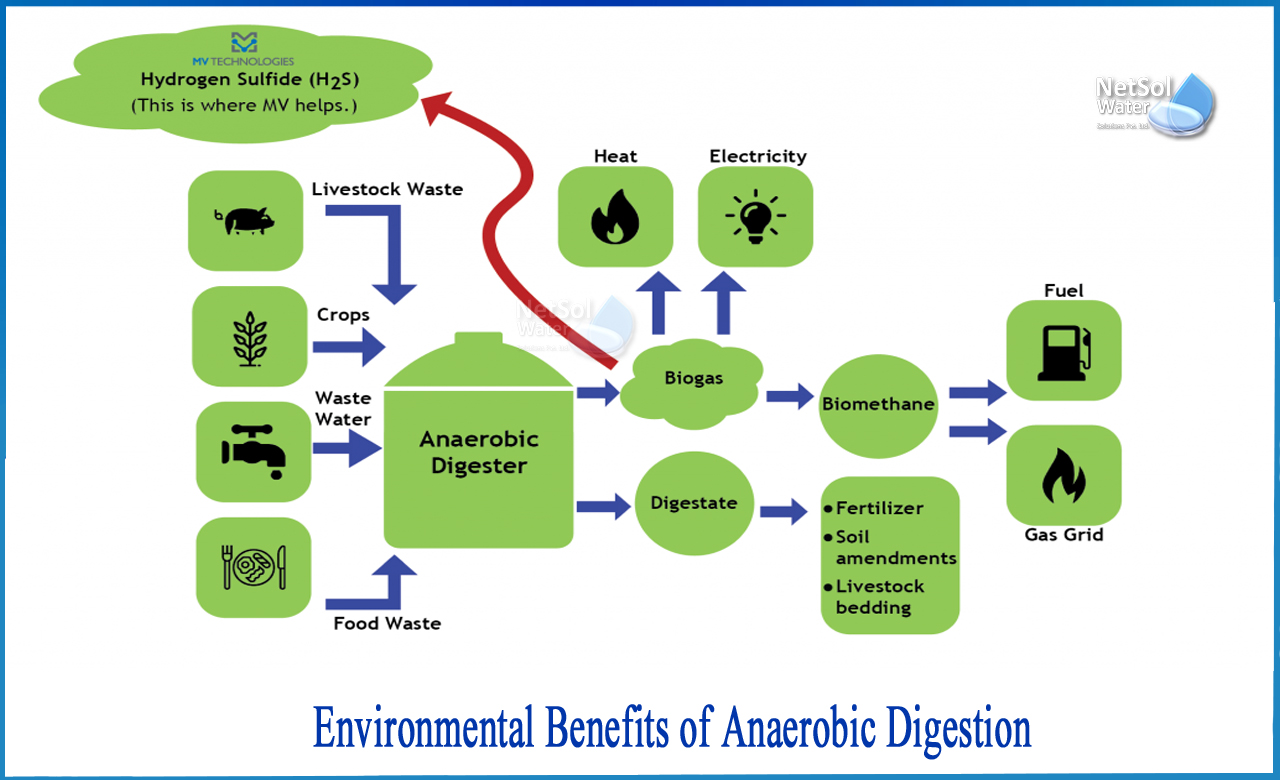What is anaerobic digestion?
Anaerobic digestion is a process that occurs in nature. Bacteria decomposes organic materials and produces biogas in the absence of oxygen. Biogas is produced as a by-product of the process, which decreases — or digests — the amount of material. The biogas can then be used as a source of energy.
Anaerobic digestion (AD) technology is widely utilised in almost every country to break down sewage sludge at wastewater treatment plants, food and beverage industry wastes, etc.
There are three stages to anaerobic digestion. Bacteria first degrade plant or animal stuff into compounds like sugar. Organic acids are formed from the degraded materials, which are then transformed to methane gas (biogas). Methane gas, organic solids and liquids, and minor amounts of hydrogen sulphide (H2S) gas are all by-products of the process.
The technologies developed by Netsol aid in the removal of H2S gas from methane. Both the biogas and the leftover organic solids and liquids can be utilised in a variety of ways after this process, providing both environmental and economic benefits.
What are the Anaerobic Digestion's Environmental Benefits?
Anaerobic digestion's role in reducing greenhouse gas emissions is one of the most obvious environmental benefits. AD operations reduce the use of fossil fuels by capturing methane gas that would otherwise be lost to the atmosphere. This helps to mitigate climate change and is especially advantageous in all cases where AD technology is used.
The application of AD technology on farms demonstrates how anaerobic digestion benefits the environment in a variety of ways. Farmers are working hard to meet rising food demand while also remaining viable and profitable in today's global market. Efficient water and nutrient use for crop and livestock needs can help reduce costs and environmental impacts while also contributing to safer, more productive farms.
On farms, digesters can:
1: Reduce pathogens to protect animal and human health.
2: Increase crop productivity and yield by converting waste nutrients into more accessible forms for plants compared to raw manure.
3: Recycle nutrients on the farm to create a food production system that is both economically and environmentally sustainable.
4: Reduce the farm sector's reliance on fossil fuel energy by producing heat, power, or fuel from biogas that may be used on-site.
5: Accept food waste from establishments such as restaurants and supermarkets. As a result, less food waste is disposed of in landfills. Food waste has the added benefit of improving farm digester efficiency.
Anaerobic Digestion's Economic Benefits
Using anaerobic digestion technologies has a number of economic advantages in addition to several environmental advantages.
Wastewater treatment facilities that include food waste into anaerobic digesters save money in two ways: by reducing energy costs through onsite power generation and by receiving tipping fees from food processing firms.
Food and beverage processing facilities can reap the same benefits on site, but food waste has become increasingly popular in wastewater treatment facilities in recent years.
The building and maintenance of digesters generate local job opportunities and boost municipal tax revenue in a variety of ways. Digesters make it possible to:
1: During the planning and construction phases of the operation, local contractors specialising in site work, concrete, plumbing, electrical, permitting, and engineering can be used.
2: Once the system is completed and operational, skilled labourers will be needed to keep it running smoothly.
3: Nutrients, manure solids, and energy markets-related businesses.
4: Agro-tourism is a type of tourism in which visitors learn about environmental improvements and the origins of their food by visiting farms.
Conclusion
Apart from offering chances, the adoption of AD technologies opens up a new revenue stream by allowing organic nutrients from digested waste by-products to be sold to other agriculture and horticulture sources.
Due to the use of biogas to generate electricity and fuel on-site vehicles, all industries that use anaerobic digestion technology have the ability to minimise energy costs. This reduces reliance on local utilities.
AD operations, on the other hand, provide an additional revenue stream by allowing the processing source to sell excess biogas or biogas-generated electricity to local utilities, thereby providing locally sourced renewable energy to the community.
Netsol Water is Greater Noida-based leading water & wastewater treatment plant manufacturer. We are industry's most demanding company based on client review and work quality. We are known as best commercial RO plant manufacturers, industrial RO plant manufacturer, sewage treatment plant manufacturer, Water Softener Plant Manufacturers and effluent treatment plant manufacturers. Apart from this 24x7 customer support is our USP. Call on +91-9650608473, or write us at enquiry@netsolwater.com for any support, inquiry or product-purchase related query.



